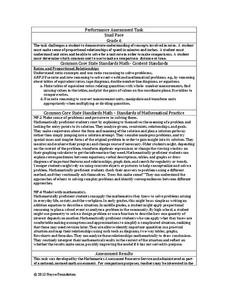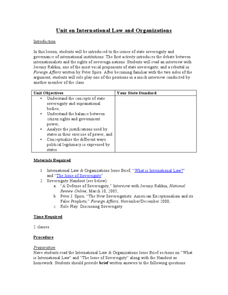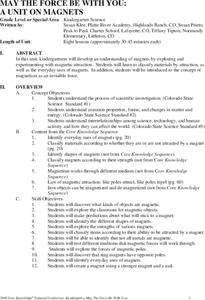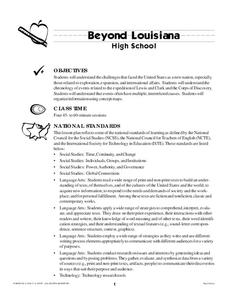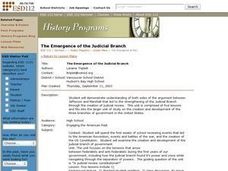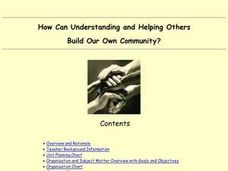Noyce Foundation
Snail Pace
Slow and steady wins the race? In the assessment task, scholars calculate the rates at which different snails travel in order to find the fastest snail. Hopefully, your class will move much more quickly in finishing the task!
Curated OER
Unit on International Law and Organizations
Pupils participate in a debate between internationalists and the rights of sovereign nations. They read interviews and role play one of the sides in a mock interview.
Curated OER
Competing National Stories in Tibet
Learners research the Tibetan conflict from the point of view of both Tibet and China. They review resources produced by both factions and then apply these skills to consider other competing national stories.
Curated OER
The Impact of AIDS in Africa and its Effect on the United States
Eleventh graders explain the social devastation visited on seven nations of sub-Saharan Africa by the AIDS pandemic, with particular emphasis on the damage to educational systems, women, and Students.
Curated OER
May the Force Be With You: A Unit on Magnets
Students uncover data about magnets and practice classifying them by amounts of attraction and magnetism as an invisible force is introduced. The unit presents the topic within eight lessons.
Curated OER
The Best Place in the United States to Live
Students, working in small groups, analyze information provided in U.S. maps to make a logical determination of the best place to live in the United States in regards to natural and human-made hazards. Then, working individually, they...
Curated OER
Using Oral History to Understand Immigrant History
Students use oral history to comprehend how life chaned for men, women, and childern when they immigrated to the United States. Students conduct interviews with immigrants in an attempt to interpret hardships, lifestyles, careers, and...
Curated OER
Beyond Louisiana
Eleventh graders examine the challenges that faced United States as a new nation. For this American History lesson, 11th graders study the chronology of events leading up to the expedition of Lewis and Clark. Students...
Curated OER
We the People: 270 out of 538
Students engage in a lesson that helps them better explain the quadrennial ritual surrounding the election of a president in the United States of America.
Curated OER
They Were Born Where?
Students assess where the presidents of the United States were born and analyze the role of geography in determining the outcome of presidential elections. They create graphs visualizing the birth and home states of the presidents along...
Curated OER
Early Presidents and Politics
Students investigate early presidents of the United States. Students complete a series of lessons in which they research the contributions and political climate during the terms of U.S. presidents from George Washington to Andrew Jackson.
Curated OER
Judicial Review
Student demonstrate understanding of both sides of the argument between Jefferson and Marshall that led to the strengthening of the Judicial Branch through the creation of judicial review. Unit is comprised of five lessons and fits into...
Curated OER
The Emergence of the Judicial Branch
Students demonstrate understanding of both sides of the argument between Jefferson and Marshall that led to the strengthening of the Judicial Branch through the creation of judicial review.
Curated OER
Launching the New U.S. Navy
Students analyze United States Constitution, locate general references to common defense, and specific references in document to U.S. Navy. Students then respond to questions on Document Analysis Worksheet, and discuss relationship...
Curated OER
Teaching With Documents Lesson Plan:Launching the New U.S. Navy
Pupils demonstrate understanding of the issues related to the creation and ratification of the United States Constitution and the new Government it established.
Curated OER
The President's Role and Succession
Fourth graders examine the role the President of the United States plays in American government and the order of succession of cabinet members. They explain about presidential qualifications and the path to becoming President.
Curated OER
Growth of a Nation: Trading Cards
Students research and write about events and people that have contributed to the development of Canada. They develop their paragraphing skills and create a package of 10 Canadian History Trading Cards.
Curated OER
Democracy: An Introduction.
Learners study the U.S. Constitutional System and how it compares with forms of democracy that developed in ancient Greece and Rome. They list and explain the requirements it takes to form a society to be considered a nation.
Curated OER
The Prairie Dog That Met the President
Students identify and interpret the relationships between music, the other arts, and disciplines outside the arts. They identify and relate to music in relation to history and culture. Finally, students gain knowledge of the history of...
Curated OER
Core Democratic Values of American Constitutional Democracy
Learners describe the ideas found in the core democratic values. In groups, they design and create a brochure explaining how the values relate to other ideas that Americans accept as a nation. They share what they know with with...
Curated OER
How Can Understanding and Helping Others Build Our Own Community?
Students examine the different cultures and disabilities people face in their community. They discuss how they can become better citizens. They answer discussion questions to finish the lesson.
Curated OER
Constitutional Convention
Eighth graders gain a greater understanding of the Constitutional Convention of 1787, and the issues surrounding the development of our Constitution. They participate in an activity and listen to lecture on the Convention, then search...
Curated OER
Understanding Zoning: Its use on the High Line in West Chelsea
Students are introduced to zoning. Evaluating information and reading a land-use map is enclosed in this lesson. List new development projects that they could propose for a given area.
Curated OER
Understanding Stereotypes
Students examine the role of stereotypes in their lives. They discuss how making unfair judgments about people affects one's view of the world. They complete a worksheet to end the instructional activity.
